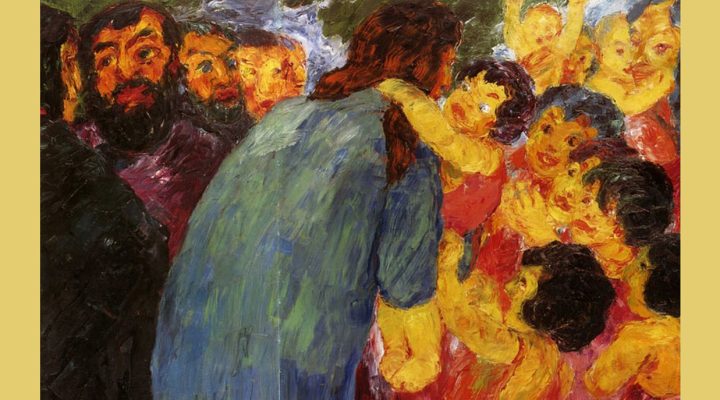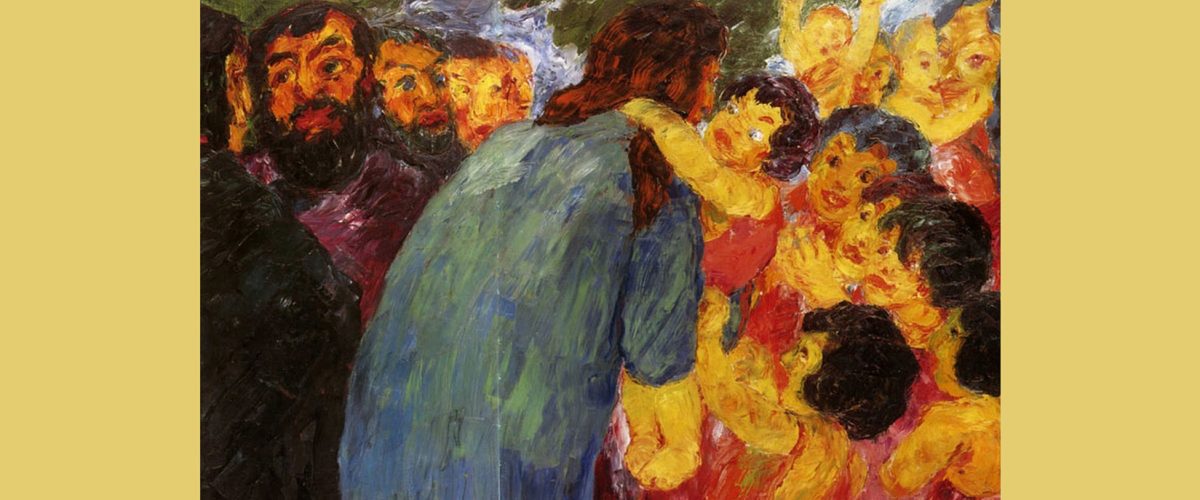Remember the parable where Jesus warned against thankfulness in corporate worship? It’s a well-known parable in Luke 18, the first in a trilogy of scenes that question our assumptions about status and blessing in relationship with others.
In the third scene, Jesus tells a rich ruler to “sell all you own and distribute the money to the poor.” But the rich ruler sees the blessing of his financial status as something he can’t give up in exchange for a lower status.
In the second scene, Jesus tells his disciples to “let the little children come to me.” According to the culture of the Roman Empire, babies were considered to have the lowest social status. So the disciples saw the blessing of their social status as male disciples as a sacralized excuse to “sternly order” the people not to bring their lower-status babies to Jesus.

Rick Pidcock
In the first scene, Jesus tells a parable of two men going to the temple to pray. During their time of worship, one of them gives thanks, saying, “God, I thank you that I am not like other people: thieves, rogues, adulterers or even like this tax collector.” The other worshiper stands at a distance, doesn’t presume to look up to the place of highest status, beats his breast and says, “God, be merciful to me, a sinner!”
Jesus responds by saying the second man is justified, while the first is not. He explains, “For all who exalt themselves will be humbled, but all who humble themselves will be exalted.”
Not random scenes
While these three stories may appear to be random scenes about Jesus’ life, they fit together thematically through their critique of hierarchy. Each story features men who see the world through the lens of hierarchy, with their position being over others. And at the end of each story, each of those men is confronted by Jesus.
“Each story features men who see the world through the lens of hierarchy, with their position being over others.”
In each story, Jesus forsakes any claim on the hierarchy he could have and becomes present in and among those lower in the hierarchy. Jesus becomes poor. He embraces the children. And when it comes to thieves, rogues, adulterers and tax collectors, Jesus doesn’t condemn them. He dines with them. His posture toward them is one of hospitality.
He reclines on the floor with them, perhaps leaning on a cushion to soften the pressure of the floor on his muscles after a long walk or a hard day’s work. He enjoys bread, grains and vegetables, perhaps prepared in stews. During the spring and summer, he likely drinks fresh goat’s milk or savors butter, cheese and honey. Due to an unpredictable climate, he might develop an affection for grapes dried into raisins or get a buzz out of local wines. And perhaps for dessert, he has a weakness for freshly baked fig cakes.
But while his body relaxes and he experiences the tastes and aroma of food and drink, he is present to his neighbors. Is Jesus an introvert or an extrovert? Does he quietly prefer the smaller gatherings or feel awkward having that first conversation with a stranger? He has many of the same human conversations we have — asking people about what they do, where they’re from, who they love, what things they enjoy.
If Jesus is someone people like to hang out with over meals, then he probably likes to laugh, learns to listen, and maybe occasionally cares enough to cry. For him, the blessing isn’t in his position over his neighbors, but in his presence with them, in and among their gatherings of embodied hunger, thirst and filling.
Hospitality
In Reaching Out: The Three Movements of the Spiritual Life, Henri Nouwen says: “Hospitality means primarily the creation of a free space where the stranger can enter and become a friend instead of an enemy. Hospitality is not to change people, but to offer them space where change can take place. It is not to bring men and women over to our side, but to offer freedom not disturbed by dividing lines. It is not to lead our neighbor into a corner where there are no alternatives left, but to open a wide spectrum of options for choice commitment. It is not an educated intimidation with good books, good stories and good works, but the liberation of fearful hearts so that words can find roots and bear ample fruit.”
“Hospitality is not to change people, but to offer them space where change can take place.”
Nouwen adds: “The paradox of hospitality is that it wants to create emptiness, not a fearful emptiness, but a friendly emptiness where strangers can enter and discover themselves as created free; free to sing their own songs, speak their own languages, dance their own dances; free also to leave and follow their own vocations. Hospitality is not a subtle invitation to adopt the lifestyle of the host, but the gift of a chance for the guest to find his own.”
Jesus saw blessing as the presence of God’s hospitality toward us that frees us to give space for our social hierarchies to be deconstructed and our inner posture toward one another to open. In his presence, the rich and poor, the old and young, the worshiper and the adulterer could have a meal together, move toward one another and see what happens.
What we worship
This is not the case in too much of our worship today.
In our society, male worshipers are promoting the criminalization of adulterers, male school principals are justifying the violence of spanking kids at school, male pastors are promoting the violence of owning women and children, and male executives are building generational wealth on the backs of Black and Hispanic women.
In many cases, our worship gatherings have promoted politics and power rather than liberation and love. One way this happens is in the lyrics we use when we talk about ourselves. Like the worshiper Jesus spoke about, we gather at our places of worship to thank God that we are no longer slaves, no longer blind, no longer worthy of eternal damnation. But what we don’t realize is that when we frame our past with these images, we’re framing our non-evangelical neighbors’ present with these images. We are, in effect, telling them they are slaves, they are blind, they are worthy of being damned forever.
We’re setting our status above them. And we don’t recognize the hierarchy we’re forming because we think we’re being thankful for how blessed we are. By saying, “God, I thank you that I’m no longer who I was,” our subconscious mind is saying, “God, I thank you that I’m not like them.” And that’s the exact hierarchy that Jesus was subverting.
How would our worship look if, rather than seeing blessing as reflecting the words and power values of hierarchical men, we reflected the actions and presence values of Jesus, who created a “friendly emptiness where strangers can enter and discover themselves as created free; free to sing their own songs, speak their own languages, dance their own dances?”
Rick Pidcock is a 2004 graduate of Bob Jones University, with a Bachelor of Arts degree in Bible. He’s a freelance writer based in South Carolina and a former Clemons Fellow with BNG. He recently completed a Master of Arts degree in worship from Northern Seminary. He is a stay-at-home father of five children and produces music under the artist name Provoke Wonder. Follow his blog at www.rickpidcock.com.
Related articles:
Two viruses threaten the life of the Southern Baptist Convention: Male hierarchy and dominion theology | Analysis by Ellis Orozco
Reimagining the ‘kingdom’ of God as something other than an ancient hierarchy | Opinion by Rick Pidcock


